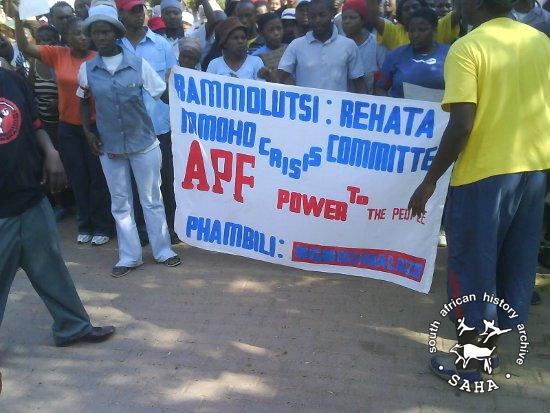"Kliptown is a no-go area for the government, they are so afraid of it because they know people that side are fighting and we have also achieved to fight the ANC, even the DA in the area. We managed also to win the RDP houses which were built in Kliptown … also we managed to join up with people who are staying in the flats to make one committee with them, we speak in one voice and now we have managed to take out the management in the Walter Sisulu Square, they will be leaving at the end of this month so we hope that the changes are coming. "
From the early 2000s, the predominately shack settlements of Kliptown and Thembalihle (both located on the south side of Soweto) began to organise themselves to struggle for basic services and housing.
Kliptown holds a special place in South Africa’s liberation history – it was the site of the ‘Congress of the People’ gathering in the 1950s that led to the adoption of the Freedom Charter and also a place where Nelson Mandela hid from the apartheid forces. And yet, Kliptown has remained – in the post-apartheid period - one of the poorest and least serviced communities with a severe lack of housing and basic services, where a multi-million Rand ‘Freedom Square’ has been constructed side-by-side with the grinding poverty of shack dwellers where the bucket system of sanitation continues.
“...in Thembelihle what happened is that the people who formed TCC had the belief, had this idea that we need to form an organisation that will make sure that we get electricity in Thembelihle, that was the main purpose of the commission of TCC which I joined at a very early stage of its formation and also bought the idea that we need to use the commission to fight for electricity. But as time goes by it became clear that, well, why not fight for all … water, housing and so forth? So currently that’s what TCC is fighting for, to get it all there.”
Besides consistent engagement with whatever inst itutional avenues / mechanisms were available (e.g. the City of Johannesburg, local councillors, ward committees etc.) many subsequent ‘battles’ were fought over the succeeding years in these communities with police as a result of demonstrations and marches led by the two community organisations (both APF affiliates) – the Kliptown Concerned Residents and the Thembalihle Crisis Committee. The respective struggles intensified again in 2007 which two reports on Kliptown and Thembalihle, drawn up by APF organisers, explore in detail. While the struggles have resulted in some positive developments (e.g. stopping of whole-scale evictions, better basic services), the housing situation and general material conditions in these communities continues to be the source of dissatisfaction and conflict.
itutional avenues / mechanisms were available (e.g. the City of Johannesburg, local councillors, ward committees etc.) many subsequent ‘battles’ were fought over the succeeding years in these communities with police as a result of demonstrations and marches led by the two community organisations (both APF affiliates) – the Kliptown Concerned Residents and the Thembalihle Crisis Committee. The respective struggles intensified again in 2007 which two reports on Kliptown and Thembalihle, drawn up by APF organisers, explore in detail. While the struggles have resulted in some positive developments (e.g. stopping of whole-scale evictions, better basic services), the housing situation and general material conditions in these communities continues to be the source of dissatisfaction and conflict.
Throughout its existence, the APF also organised and supported many communities outside of the Gauteng province. One such community – Rammolutsi - was situated in the rural-farming area of the northern Free State and its ‘Crisis Committee’ affiliated to the APF as part of its struggle for basic services – particularly water/ sanitation and housing. Several public and protest activities were held there over a number of years.
"If you don't stand up and make a difference in our communities no one will. If we were to rely on the government...it might take fifty years to come so at the moment we will be struggling, suffering because it affects us directly now. So we are standing up."
Meshack Tladi - Vaal Region & Youth Learners' Representative Forum


